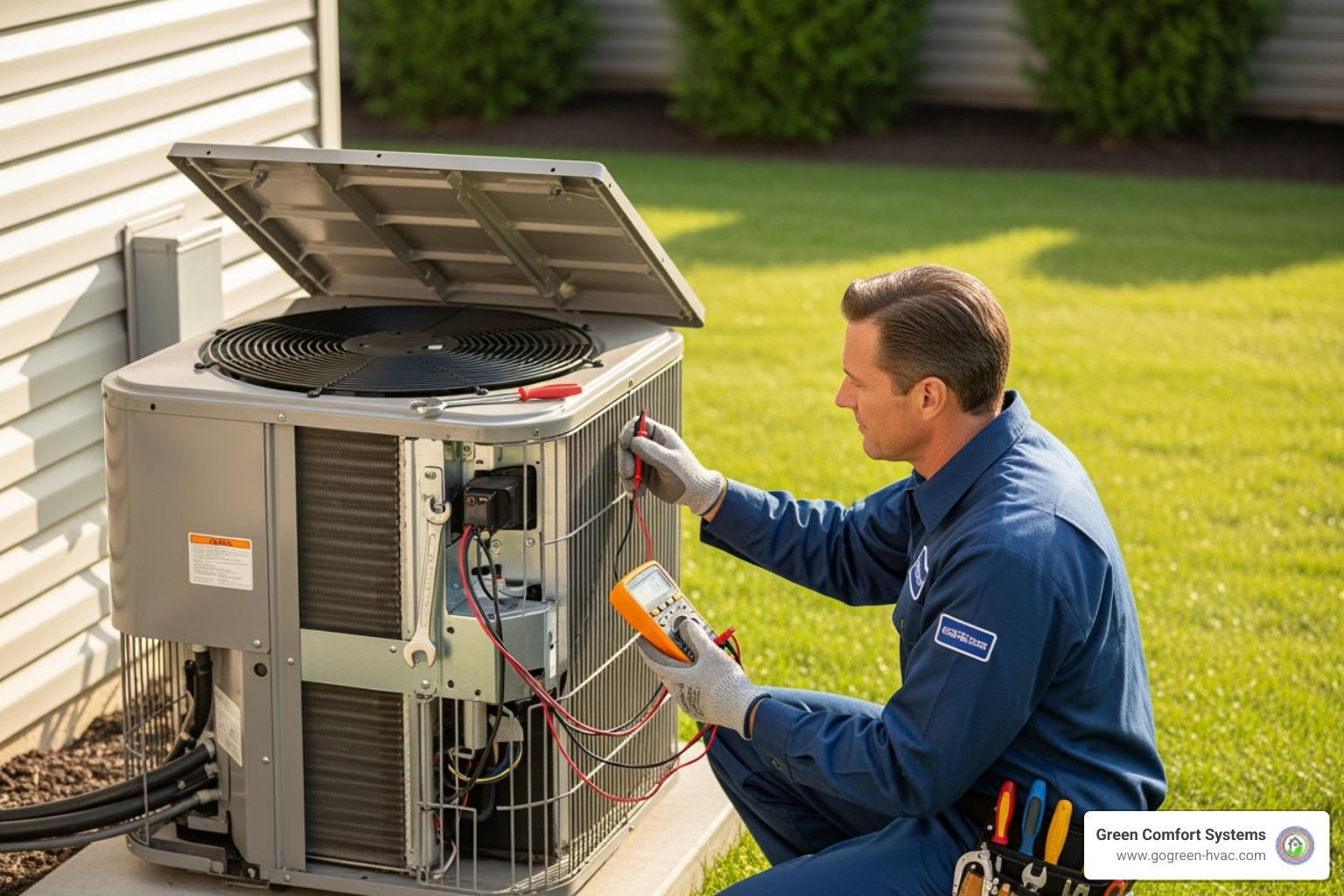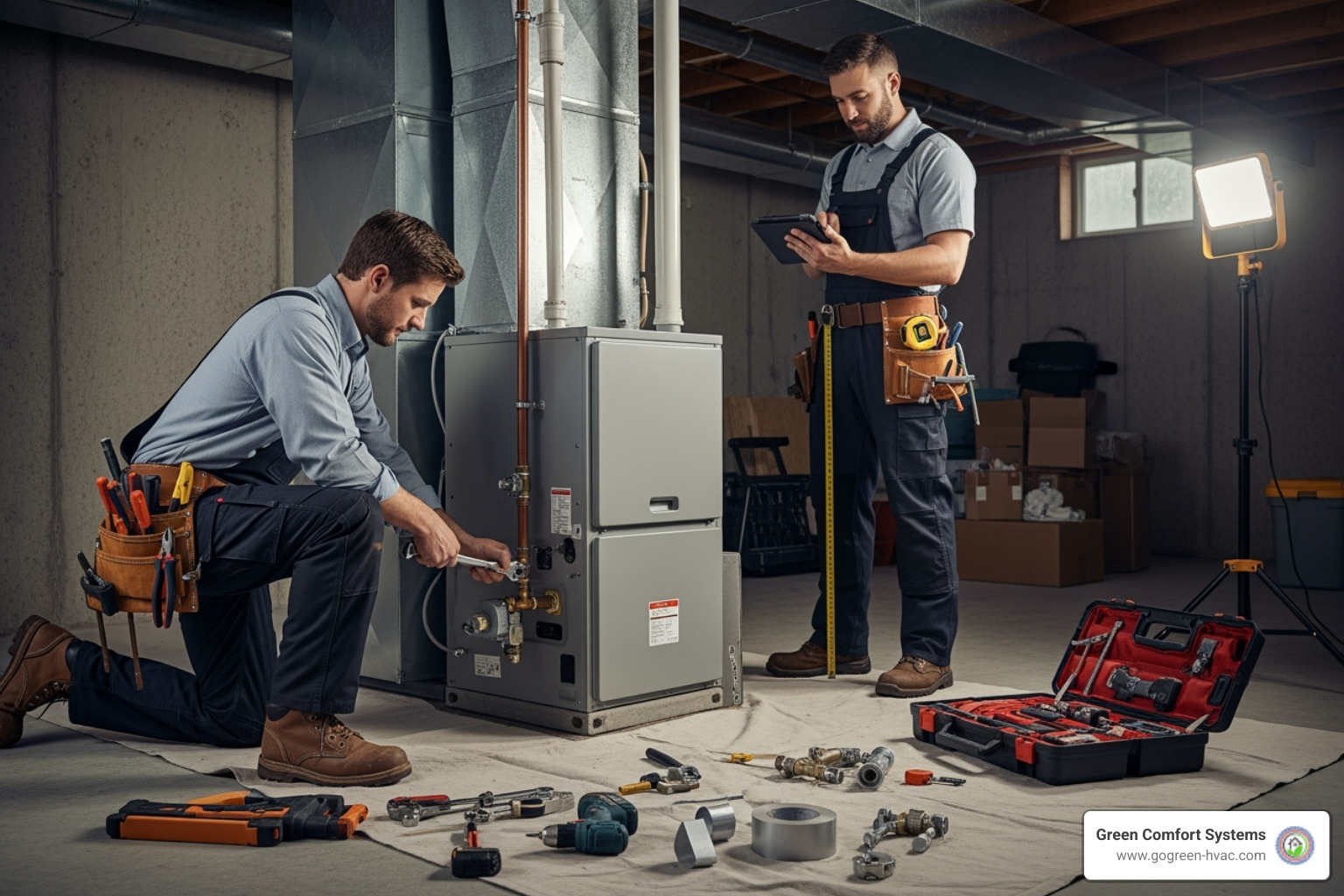Heating Up: A Comprehensive Guide to Boiler Installation Steps

Why Understanding Boiler Installation Steps Matters
Understanding boiler installation steps is crucial when considering a new heating system. Whether replacing an old unit or installing a new one, this knowledge helps you make informed decisions and ensures your investment provides reliable comfort for years.
The essential boiler installation steps include:
- Pre-installation assessment: Evaluating heating needs and selecting the right boiler.
- System preparation: Removing the old unit and preparing pipework.
- Physical installation: Mounting the new boiler and connecting all systems.
- Testing and commissioning: Ensuring everything works correctly and safely.
- Final handover: Providing documentation and homeowner education.
- Ongoing maintenance: Servicing to maintain efficiency and prevent breakdowns.
Installing a boiler involves complex work with gas, electricity, and water. As one industry expert notes: "Installing a boiler requires training, a specific skill set, and extensive experience. It can be extremely dangerous due to working with water lines, gas lines, and electricity."
Most installations take 1-3 days. A simple replacement may take a day, while complex jobs take longer.
Professional installation is often legally required. Certified engineers must handle gas connections. Improper installation can void warranties, create safety hazards, and lead to costly problems. Understanding these steps helps you prepare, ask the right questions, and hire qualified professionals.

Phase 1: Pre-Installation Planning and Preparation
Proper planning is the foundation of your new heating system. This phase involves understanding your home's unique needs to create a heating solution that fits your lifestyle and budget.
Choosing the Right Boiler for Your Home
Selecting the right boiler can feel overwhelming, but we can guide you through the process. We consider your home's size, insulation, and the number of bathrooms to calculate the correct boiler size that will keep you comfortable without wasting energy.
Energy efficiency ratings are crucial. We focus on AFUE (Annual Fuel Utilization Efficiency) ratings, which indicate how much fuel heats your home versus being lost. Modern boilers can achieve AFUE ratings of 90% or higher, a significant improvement over older units.
The fuel type available—typically natural gas, oil, or electric—also shapes your options. Most homes use natural gas for its cost-effectiveness and clean-burning properties.
| Boiler Type | Description | Best Suited For | Key Benefits |
|---|---|---|---|
| Combi Boiler | Heats water on demand for both central heating and domestic hot water. No separate hot water cylinder or cold water tank needed. | Smaller homes with 1-2 bathrooms and limited space. | Compact, energy-efficient (heats water only when needed), instant hot water. |
| System Boiler | Heats water for central heating and stores hot water in a separate hot water cylinder. No cold water tank needed. | Homes with multiple bathrooms that need consistent hot water supply to several taps simultaneously. | Consistent hot water supply, compatible with advanced controls, no cold water tank needed. |
| Conventional Boiler | Also known as "heat-only" boilers. Heats water for central heating and stores hot water in a separate hot water cylinder. Requires a cold water tank in the attic. | Larger homes with traditional heating systems or where high hot water demand requires large storage. | Ideal for homes with multiple bathrooms, can support multiple hot water outlets simultaneously. |
Combi boilers are space-savers perfect for smaller homes. System boilers are great for busy families needing hot water at multiple taps at once. Conventional boilers are workhorses for larger homes with high hot water demands. During our consultation, we'll assess your situation and recommend the best option. You can find more info about Boiler Installation in Baltimore, MD on our website.
Essential Tools and Materials
While this is our job, it's helpful to know that professional installation requires specialized equipment. Our certified technicians arrive with everything needed, including pipe cutters, benders, power drills, multimeters for electrical testing, and flue gas analyzers to ensure your boiler burns fuel efficiently and safely. This equipment requires extensive training to use correctly.
Preparing Your Home and Ensuring Safety
Before installation day, we'll ask you to prepare the area. This is crucial for safety and keeping the project on schedule.
Clear the installation area by removing furniture or anything that might obstruct access. We need a clear path from the door to the work area.
We also need clear access to your main water shut-off, gas meter, and electrical panel. We will safely shut off these utilities before work begins. Safety is the first step in our boiler installation steps.
In older homes, we check for hazardous materials like asbestos. If suspected, work stops, and we recommend proper abatement procedures. Proper preparation ensures your installation proceeds smoothly and safely.
Phase 2: The Core Boiler Installation Steps
Once planning is complete, our certified technicians begin the technical process of bringing your new heating system to life.

Removing the Old Boiler
First, we carefully remove your old boiler. We start by draining all water from the existing system to prevent messes. Next, our certified technicians safely disconnect water pipes, electrical connections, and the gas line. The old flue system is also dismantled. Finally, we handle the safe and eco-friendly disposal of your old boiler, following all local regulations.
System Flushing and Pipework Modification
To give your heating system a fresh start, we perform a power flush or chemical flush. This process removes years of accumulated sludge, rust, and debris that can reduce efficiency and cause noisy pipes or cold spots on radiators. Just 1/8 inch of scale can reduce efficiency by up to 25%, as detailed in studies on the impact of scale on efficiency. Our technicians also adapt existing pipework as needed to ensure a seamless connection for your new boiler.
Mounting, Connecting, and Wiring the New Boiler
This is where your new boiler is installed. We begin by securing the boiler mount to ensure the unit is perfectly level, which prevents stress on the pipework. We then connect the water supply lines using high-quality fittings and install isolation valves for future maintenance. For gas boilers, the gas line connection is a critical safety step handled only by our certified professionals, with every connection tested for leaks. Electrical wiring is done according to strict manufacturer and local codes, followed by the integration of your thermostat and control systems for optimal comfort and efficiency.
Proper Ventilation and Flue Installation
The flue system is vital for safety, as it vents dangerous combustion gases like carbon monoxide outside. Carbon monoxide prevention is our top priority. We install the correct flue type for your home—either a horizontal flue through a wall or a vertical one through the roof—and carefully seal every joint to prevent leaks. All our flue installations comply with manufacturer guidelines and local building codes throughout Maryland, including Rosedale, Catonsville, and Dundalk, to keep your family safe.

These boiler installation steps require expertise and specialized tools, which is why professional installation is essential for a job done right the first time.
Phase 3: Post-Installation Commissioning and Handover
Once your boiler is installed, this final phase ensures it runs safely and efficiently, and that you are confident operating it.
Testing, Adjustments, and Final Checks
We bring your new system to life and ensure every component works in harmony. This involves several key checks:
- Filling the system: We carefully add water to the pipework and radiators.
- Bleeding the radiators: We remove trapped air from each radiator to eliminate cold spots and ensure even heating.
- Pressure testing for leaks: We pressurize the system to the manufacturer's recommended level (typically 1-1.5 bar) and inspect every joint and valve for leaks.
- Firing up the boiler: We start the boiler, listening for normal operation sounds and ensuring the burner ignites correctly.
- Checking combustion: Using a flue gas analyzer, we fine-tune the air-fuel mixture for optimal efficiency, safety, and minimal emissions.
- System functionality test: We verify that radiators heat up, hot water flows properly, and all safety devices are working.
Should any issues arise, our team can diagnose and resolve them promptly. We are always available for future needs with our comprehensive Boiler Repair Services.
Understanding Your New System and Important Documentation
Once testing is complete, we walk you through your new system. We want you to feel comfortable with your investment.
We will explain your controls and thermostat, showing you how to operate the boiler and set it for optimal comfort and energy savings. You will receive all user manuals for your boiler and controls.
We also guide you through warranty registration, which is essential and often requires proof of professional installation. You will receive an installation certificate confirming the work was completed to all relevant standards. For gas boilers, we complete a Benchmark Gas Boiler Installation, Commissioning, and Service Record, an industry-standard document vital for your warranty and future servicing.
Phase 4: Long-Term Boiler Maintenance for Longevity and Efficiency
Your new boiler is installed, but like a car, it needs regular attention to run smoothly for years. Maintenance is an investment in efficiency and longevity, especially since fuel costs are a boiler's largest lifetime expense.

Best Practices for Boiler Maintenance
Proactive care can prevent most heating emergencies. Here are some best practices:
- Annual professional servicing: This is the golden rule. Schedule a service in late summer or early fall to catch small issues before they become big problems. Most manufacturers require it to keep your warranty valid.
- Check boiler pressure: The gauge should read between 1 and 1.5 bar. If it drops or climbs consistently, it needs professional attention.
- Bleed your radiators: If you notice cold spots at the top of radiators, trapped air is the likely cause. Bleeding them with a radiator key will restore even heating.
- Insulate exposed pipes: Insulating pipes in basements or crawl spaces reduces heat loss, saves energy, and helps prevent frozen pipes.
For professional assistance, our Boiler Maintenance Services cover everything from routine checks to seasonal tune-ups.
Troubleshooting Common Issues
Before calling for service, here are a few things you can check:
- Unusual noises: Gurgling often means trapped air that can be fixed by bleeding radiators. A loud banging or "kettling" noise indicates limescale buildup and requires a professional.
- Low pressure: Check for visible leaks around pipes or radiators. If none are found, the system may just need to be repressurized.
- Radiators not heating evenly: This usually points to trapped air or a system that needs balancing by a professional.
- Boiler won't turn on: Check that your thermostat is calling for heat, the boiler's power switch is on, and the circuit breaker hasn't tripped. Also, ensure the gas supply valve is open.
Important: If you ever smell gas or feel uncertain about an issue, turn off your boiler immediately and call a professional. Your safety is our top priority.
Frequently Asked Questions about Boiler Installation
Here are answers to some of the most common questions we receive from homeowners about boiler installation.
How long does a typical boiler installation take?
The timeline depends on the complexity of the job.
- Like-for-like swaps, where a new boiler replaces an old one in the same location, can often be completed in a single day.
- Complex installations, such as moving the boiler, changing the boiler type, or requiring significant pipework modifications, typically take 1-3 days.
We provide a realistic timeline upfront so you can plan accordingly.
What is the average cost of a new boiler installation?
While every installation is unique, the total cost is influenced by several factors:
- Boiler type: Combi, system, and conventional boilers have different price points.
- Labor costs: This reflects the time and expertise of our certified technicians to ensure a safe, code-compliant installation.
- System modifications: Upgrading or rerouting pipes, gas lines, or electrical wiring will affect the cost.
- Flue installation complexity: A simple horizontal flue is less expensive than a vertical one running through the roof.
- Additional features: Smart thermostats or power flushing services can be added.
We provide a detailed, written quote so you know exactly what is included in the price.
Is a professional installer legally required?
Yes, absolutely, especially for any work involving gas lines. This is a matter of safety and legality.
- Gas regulations: In Maryland, only certified professionals are legally allowed to work on gas-fired appliances. Mistakes with gas lines can be catastrophic.
- Electrical work: Boiler wiring involves specific safety circuits that require professional expertise.
- Insurance and warranty: Most manufacturers will void their warranties if the unit is not installed by a qualified professional. Your home insurance may also not cover damage from a DIY installation.
DIY installation carries severe risks, including carbon monoxide poisoning, gas leaks, and fires. Our technicians are fully licensed, certified, and insured to ensure your boiler installation steps are completed safely and correctly.
Conclusion
Understanding the boiler installation steps empowers you to make smart decisions about your home's heating. From the initial assessment to the final safety checks, every step is crucial for ensuring your new system is safe, efficient, and reliable. Professional installation is not a DIY project; it's an investment in your family's safety and comfort, ensuring your boiler provides warmth for years to come.
A properly installed boiler leads to lower energy bills, fewer repairs, and the peace of mind that the job was done right.
At Green Comfort Systems, we have been keeping families comfortable across Maryland for years, serving communities like Rosedale, Catonsville, Dundalk, and Ellicott City. We are committed not only to your comfort but also to our planet—we plant a tree for every service and installation we complete.
Ready to take the next step toward a warmer, more efficient home? We're here to guide you. Contact us for your professional boiler installation in Essex, MD and experience the difference of working with a team that cares about your comfort and our shared environment.
Book Expert Service Or Contact Us
Other Blogs





Get Financing Today
Get the comfort you deserve, without the financial stress.

Latest Blogs









